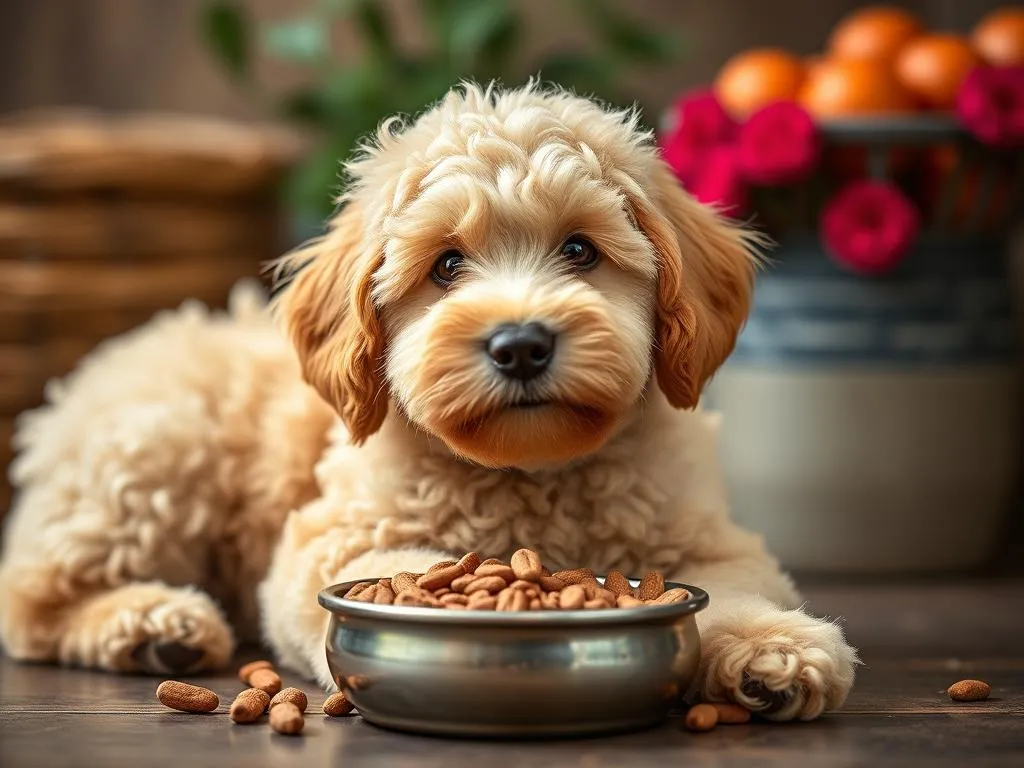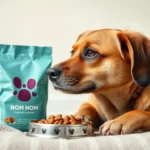
Introduction
Mini Goldendoodles are a delightful crossbreed, combining the intelligence and friendliness of a Golden Retriever with the affectionate and playful nature of a Miniature Poodle. Typically weighing between 15 to 35 pounds and standing around 13 to 20 inches tall, they are known for their soft, curly coats and friendly demeanor. This breed is not only adorable but also highly trainable, making them great companions for families, singles, and seniors alike.
A well-balanced diet is crucial for Mini Goldendoodles, as it directly affects their health, energy levels, and overall well-being. Choosing the best dog foods for Mini Goldendoodles can help prevent obesity, support their immune system, and mitigate common health issues that may arise as they age. Here, we will explore the nutritional needs of Mini Goldendoodles, types of dog food available, and top recommendations to ensure your furry friend thrives.
Understanding Mini Goldendoodle Nutrition Needs
Nutritional Requirements
Mini Goldendoodles require a balanced diet rich in essential macronutrients:
- Proteins: Crucial for growth, muscle development, and tissue repair. Look for high-quality animal proteins such as chicken, beef, or fish as the first ingredient in dog food.
- Fats: Provide energy and support healthy skin and coat. Omega-3 and Omega-6 fatty acids promote shiny coats and healthy skin.
- Carbohydrates: Offer a source of energy and fiber for digestive health. Whole grains like brown rice and oats can be beneficial, but some dogs may thrive on grain-free options.
In addition to macronutrients, vitamins and minerals play a vital role in their diet to ensure proper growth and development. The caloric needs of Mini Goldendoodles can vary based on age, size, and activity level, typically ranging from 400 to 600 calories daily.
Common Health Concerns
Mini Goldendoodles can be prone to specific health issues, including:
- Hip Dysplasia: A genetic condition that affects the hip joint. Proper weight management and a nutrient-rich diet can help mitigate its effects.
- Allergies: Some Mini Goldendoodles may develop food allergies, requiring special diets to avoid irritants.
- Obesity: As a small breed, Mini Goldendoodles can gain weight quickly if overfed. A balanced diet and regular exercise are essential to prevent obesity.
A well-thought-out diet can significantly influence these health concerns, making it crucial for owners to choose the best dog foods for Mini Goldendoodles.
Types of Dog Food
Dry Dog Food (Kibble)
Benefits of Dry Dog Food: Kibble is convenient, cost-effective, and helps to maintain dental health by reducing plaque buildup.
Recommended Brands:
– Royal Canin Mini Goldendoodle Adult Formula: Tailored specifically for Mini Goldendoodles, this formula supports healthy skin and coat while maintaining a balanced weight.
– Blue Buffalo Life Protection Small Breed Formula: Rich in real meat and wholesome grains, this food supports overall health and vitality.
– Wellness CORE Grain-Free Small Breed: High in protein and grain-free, this option is excellent for dogs with specific dietary needs.
Considerations: Pay attention to kibble size to ensure it is appropriate for your Mini Goldendoodle. Ingredients should be high-quality, avoiding fillers like corn and soy.
Wet Dog Food
Benefits of Wet Dog Food: Canned food is often more palatable and provides additional moisture, which can be beneficial for hydration.
Recommended Brands:
– Hill’s Science Diet Adult Small Paws: This formula supports joint health and includes antioxidants for a healthy immune system.
– Merrick Grain-Free Texas Beef & Sweet Potato: Packed with protein and nutrients, this tasty option is great for picky eaters.
Considerations: Look for options with high meat content and lower fillers. Ensure that the food is balanced and appropriate for their size.
Raw Diet
Overview of Raw Feeding: Some owners choose to feed their dogs a raw diet, which includes raw meats, bones, fruits, and vegetables.
Potential Benefits and Risks: Raw diets can lead to healthier coats and improved digestion, but they also come with risks such as bacterial contamination and imbalanced nutrition. It’s vital to research thoroughly and consult a vet before transitioning.
Recommended Guidelines: If considering a raw diet for your Mini Goldendoodle, ensure that you include a variety of proteins and consult a veterinarian for balanced recipes.
Home-Cooked Meals
Benefits of Preparing Homemade Dog Food: Cooking for your dog allows you to control ingredients and ensure a balanced diet.
Essential Ingredients: A balanced meal should include proteins (like chicken or fish), carbohydrates (like brown rice or sweet potatoes), and vegetables (like carrots or peas).
Sample Recipes:
1. Chicken and Rice: Boil chicken breast and mix with cooked brown rice and steamed carrots.
2. Beef and Sweet Potato Stew: Cook ground beef with diced sweet potatoes and green beans in low sodium broth.
Top Recommended Dog Foods for Mini Goldendoodles
Premium Commercial Brands
Here’s a list of top dog food brands specifically tailored for Mini Goldendoodles:
- Royal Canin Mini Goldendoodle Adult Formula: This breed-specific formula is designed to meet the unique needs of Mini Goldendoodles, ensuring proper growth and health.
- Orijen Original Dry Dog Food: Known for its high protein content, this brand uses fresh, regional ingredients to create a biologically appropriate diet.
- Taste of the Wild High Prairie Canine Recipe: Grain-free and high in protein, this dog food includes roasted bison and roasted roasted venison, mimicking a natural diet.
- Solid Gold Leaping Waters with Cold Water Salmon: This grain-free option is packed with omega fatty acids, promoting healthy skin and a shiny coat.
- Nutro Ultra Grain-Free Small Breed: A blend of proteins from chicken, lamb, and salmon, this food offers a complete and balanced diet for Mini Goldendoodles.
Grain-Free vs. Grain-Inclusive Diets
Explanation of Grain-Free Diets: Grain-free diets eliminate grains like wheat, corn, and soy, often featuring alternative carbohydrates such as peas and potatoes.
Pros and Cons:
– Grain-Free: May be beneficial for dogs with allergies or sensitivities. However, some studies suggest potential links to heart disease, so consult with a vet.
– Grain-Inclusive: Typically more affordable and can provide necessary fiber and nutrients. However, watch for weight gain if the dog is less active.
Special Dietary Needs
For Mini Goldendoodles with specific dietary needs, consider:
- Allergy-Friendly Foods: Brands like Natural Balance L.I.D. offer limited ingredient diets to help manage food allergies.
- Weight Management Options: Look for foods specifically formulated for weight control, such as Hill’s Science Diet Adult Perfect Weight.
- Supplements: Omega fatty acids, glucosamine, and probiotics can be beneficial for overall health and well-being.
Feeding Guidelines
Portion Control
Determining the right portion size is key to maintaining a healthy weight for your Mini Goldendoodle. Follow the feeding guidelines on the dog food packaging, and adjust based on your dog’s activity level and body condition. Puppies may require more frequent feeding (3-4 times a day) while adults typically thrive on two meals.
Transitioning Foods
When changing your Mini Goldendoodle’s food, do so gradually over a week to avoid digestive upset. Start by mixing a small amount of the new food with the old, gradually increasing the new food ratio. Watch for signs of food intolerance, such as vomiting or diarrhea.
Treats and Snacks
Healthy treat options include:
– Carrots
– Green beans
– Sweet potato chews
Incorporate treats sparingly, ensuring they do not exceed 10% of your dog’s daily caloric intake to maintain a balanced diet.
Monitoring Health and Nutrition
Regular Vet Check-Ups
Routine vet visits are essential for monitoring your Mini Goldendoodle’s health. Vets can provide guidance on nutrition, help identify potential allergies, and suggest dietary adjustments based on age and activity levels.
Identifying Changes in Health
Be vigilant for signs of dietary issues, such as changes in weight, coat condition, or energy levels. Keeping a food diary can help track what your dog eats and any changes in their health, making it easier for your vet to assess their needs.
Conclusion
Selecting the best dog foods for Mini Goldendoodles is vital for their health and happiness. Understanding their nutritional needs, exploring different food types, and monitoring their health can ensure they lead a vibrant and active life. Always consult with a veterinarian for tailored dietary advice, and remember, a balanced diet is the foundation for a long and healthy life for your furry companion.









